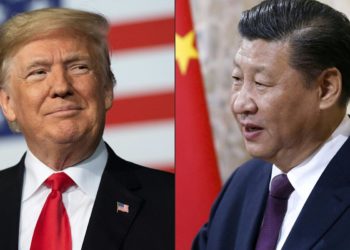U.S. intelligence agencies have undermined the rationale deployed by the Trump administration to use an 18th century wartime law to rapidly deport Venezuelan men to a notorious prison in El Salvador, according to a newly released memo.
Intelligence agencies concluded last month that the government of Venezuelan President Nicolas Maduro doesn’t direct the activities of Tren de Aragua, according to an internal memo released by a press freedom group and published Monday by The New York Times.
POLITICO obtained a copy of the memo from the Freedom of the Press Foundation.
The findings by the agencies undercut President Donald Trump’s use of the Alien Enemies Act to declare that the U.S. is under invasion by a hostile foreign nation and, therefore, that suspected gang members can be rapidly deported without judicial review.
The National Intelligence Council’s “sense of the community” memo found that Tren de Aragua likely takes advantage of widespread lawlessness under Maduro but has no direct ties to the government.
“While Venezuela’s permissive environment enables TDA to operate, the Maduro regime probably does not have a policy of cooperating with TDA and is not directing TDA movement to and operations in the United States,” the report found.
The intelligence agencies also challenged Trump’s depiction of Tren de Aragua as a preeminent threat to national security, or even much of a criminal organization. “The small size of TDA’s cells, its focus on low skill criminal activities and its decentralized structure make it highly unlikely that TDA coordinates large volumes of human trafficking or migrant smuggling,” said the April 7 memo, which the press organization obtained through the Freedom of Information Act.
The foundation said the memo confirmed earlier reporting by The Times and The Washington Post on Tren de Aragua and its relationship to the Venezuelan government and weakened the administration’s assertion that the information was deeply sensitive and that its leak warranted criminal investigations.
“The initial Washington Post and New York Times reporting about the leaked document made it crystal clear that releasing the record would be in the public interest,” said Lauren Harper, the organization’s Daniel Ellsberg chair on government secrecy. “The ODNI FOIA office clearly agreed, and made the right decision to officially release the memo — in under two weeks.”
Trump in March invoked the 1798 law to send about 250 men to a maximum-security prison in El Salvador. Lawyers and news organizations have since determined that at least some of those who were deported had entered the U.S. legally, had no criminal history or had no connection to any gang activity despite administration claims to the contrary.
Also among the men was a Salvadoran living in Maryland, Kilmar Abrego Garcia, who was deported despite a judge’s order that he be allowed to stay in the U.S. in what a lawyer for the administration termed a mistake.
Trump’s use of the Alien Enemies Act has been hotly contested by advocates and constrained several times by some of the country’s top judges — including conservatives.
The Supreme Court in April barred the White House from deporting more people under the Alien Enemies Act. The court ruled earlier that the Venezuelans deemed “alien enemies” by the White House must be allowed to file individual petitions challenging their deportations, a notion Trump has publicly challenged.
The White House and Office of the Director of National Intelligence did not immediately respond to a request for comment from POLITICO.
Just last week, a Trump-appointed judge deemed Trump’s use of the AEA to conduct swift deportations illegal, ruling that it only applies when the country is facing an armed, organized attack, another setback for the administration and its deportation agenda.
The post US intel memo undercuts Trump claims about Venezuelan gang appeared first on Politico.




